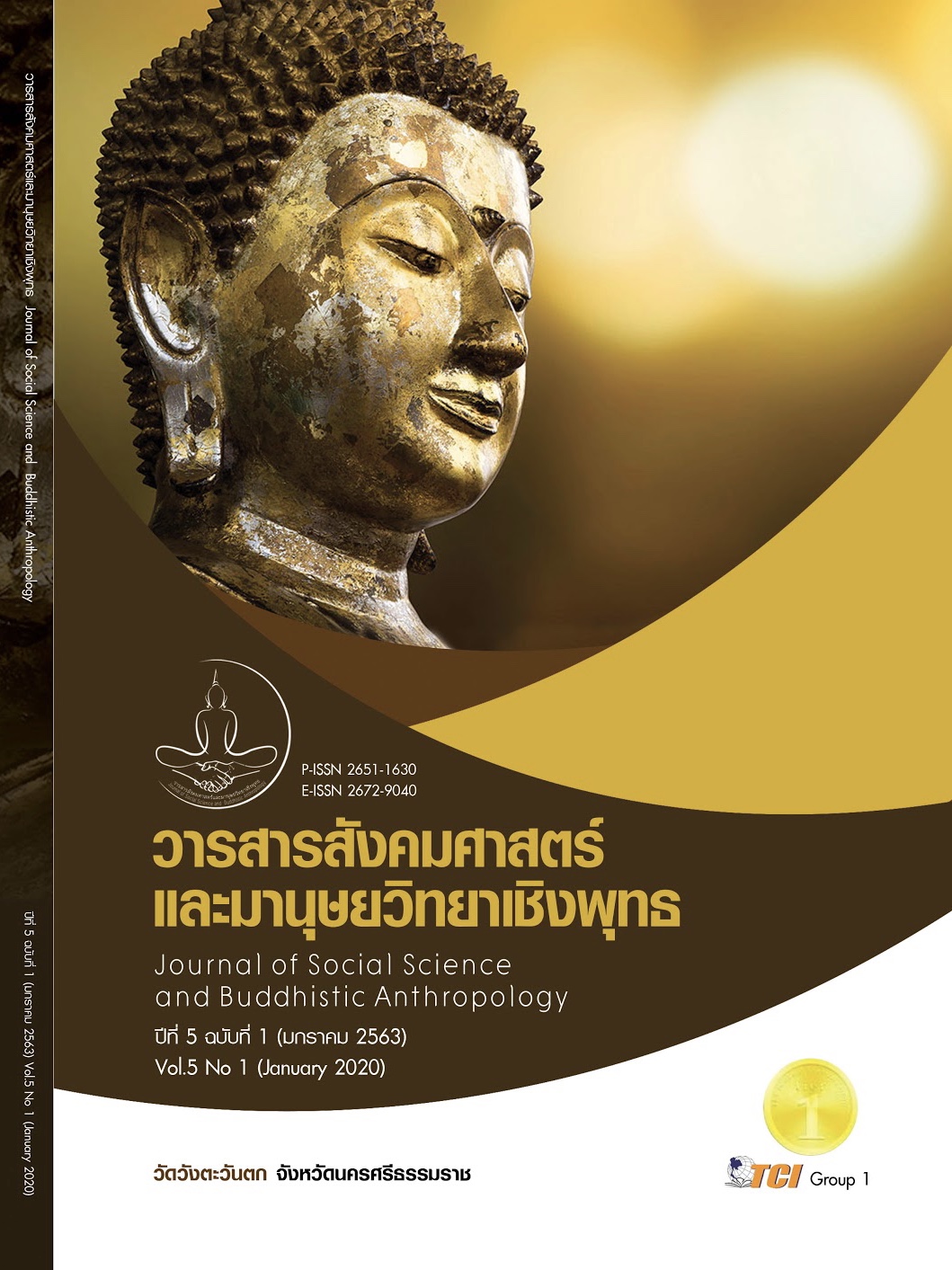A MODEL OF SELF-DEVELOPMENT FOR SUCCESS BASED ON BUDDHIST PSYCHOLOGY OF PHRABRAHMAPUNDIT (PRAYOON DHAMMACITTO)
Keywords:
Self - Development, Success, Phrabrahmapundit (Prayoon Dhammachitto)Abstract
There were 3 objectives of this research 1) to study the concepts of self development for success based on Psychology 2) to study the concepts of self development for success based on Buddhist Psychology 3) to present a Self development for Success Model based on Buddhist Psychology in perspective of Phrabrahmapundit (Prayoon Dhammachitto). The method of research is to study the concept of self development in Western psychology and Buddhist psychology from academic documents and then define the research conceptual framework. Interviewing and data analysis by content analysis and focus group were well done. The conceptual framework for studying is divided into 4 aspects i.e. 1) Learning 2) speaking 3) writing 4) management. The research results revealed as follow:-1) For studying potential, Phrabrahmapundit (Prayoon Dhammachitto) had good friends (kalyanamit) to advise in each phase of selfdevelopment. He applied 4 paths of accomplishment (Iddhipada) i.e. will (chanda) effort (Viriya) thoughtfulness (Citta) and investigation (Vimamsa) for his studies. 2)For speaking potential, he began speaking development by learning from public speakers’ speaking, finding a suitable region (Patirupadesa), self-analyzing, language training, Salikaponyeu speaking style. 3) For writing potential, he had a love of reading then wrote articles in various journals. There was a criticism from the many scholars, then brought to develop his writing. 4) For Administrative potential, he applied 4 powers (Bala) to his management i.e. power of wisdom (Panna – bala), power of diligence (Viriya-bala), power of faultlessness (Anavajja-bala) and power of sympathy (Sangaha-bala). Phrabrahmapundit (Prayoon Dhammachitto) used all 4 powers to drive the administration.
References
ธัญญภัสร์ ศิรธัชนราโรจน์. (2560). จิตวิทยากับการพัฒนาตน. กรุงเทพมหานคร: สำนักพิมพ์แห่งจุฬาลงกรณมหาวิทยาลัย.
บุญเกียรติ โชควัฒนา. (2554). หลักคิดและปรัชญาในการทำงาน. กรุงเทพมหานคร: ฝ่ายโรงพิมพ์บริษัทเอมี่ เอ็นเตอร์ไพรส์ จำกัด.
ปภัสสรา เตชะไพบูลย์. (2558). รูปแบบการทำงานที่ทำให้ประสบความสำเร็จในชีวิตของนักแสดงอาชีพไทยตามหลักพระพุทธศาสนา. ใน ดุษฎีนิพนธ์พุทธศาสตรดุษฎีบัณฑิต สาขาวิชาพระพุทธศาสนา. มหาวิทยาลัยมหาจุฬาลงกรณราชวิทยาลัย.
พระจิรวัฒน์ อุตฺตมเมธี. (2553). ศึกษาวิเคราะห์การศึกษาเพื่อพัฒนาตนตามทัศนะของพระพรหมคุณาภรณ์ (ป.อ.ปยุตฺโต). ใน วิทยานิพนธ์พุทธศาสตรมหาบัณฑิต สาขาวิชาพระพุทธศาสนา. มหาวิทยาลัยมหาจุฬาลงกรณราชวิทยาลัย.
พระพรหมบัณฑิต (ประยูร ธมฺมจิตฺโต). (2558). ภาพชีวิต. กรุงเทพมหานคร: หจก.สามลดา.
พระพรหมบัณฑิต (ประยูร ธมฺมจิตฺโต) และคณะ. (2560). วิมุตติมรรค. กรุงเทพมหานคร: โรงพิมพ์มหาจุฬาลงกรณราชวิทยาลัย.
เมธาวี อุดมธรรมานุภาพ. (2556). จิตวิทยาเพื่อการพัฒนาตน. กรุงเทพมหานคร: ห้างหุ้นส่วนจำกัด เจ.เอส.พริ้นติ้ง.
วิกรม กรมดิษฐ์. (2555). คาถาชีวิต. กรุงเทพมหานคร: บริษัท พริ้นท์ ซิตี้ จำกัด.
ศรีเรือน แก้วกังวาน. (2544). ทฤษฎีจิตวิทยาบุคลิกภาพ. กรุงเทพมหานคร: หมอชาวบ้าน.
สมเด็จพระพุทธโฆษาจารย์ (ป.อ.ปยุตฺโต). (2559). พุทธธรรมฉบับปรับขยาย. กรุงเทพมหานคร: สำนักพิมพ์ผลิธัมม์.









